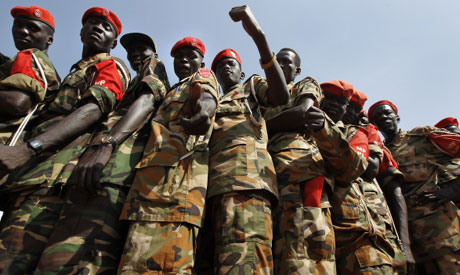
Sudan Peoples' Liberation Army (SPLA) soldiers line up to cast their vote at their base in Juba, Southern Sudan, January 2011. The U.S. is investing tens of millions of dollars into this fledgling military, one that is massing troops on the internal north-south border as tensions and violence with the north rise, (AP).
The United States, a key broker of the 2005 peace accords, is throwing considerable diplomatic and economic support behind the July 9 launch of the new state of southern Sudan, analysts say.
Despite tight budget times, officials said, the United States Agency for International Development (USAID) expects to maintain its level of development funding at between $250 million and $300 million a year.
"The commitment of the US government for development supporting this new country is really going to continue the way it was," a US government official told AFP on condition of anonymity, contradicting fears that the grossly underdeveloped region will slip off the international agenda after independence.
After the 2005 Comprehensive Peace Agreement (CPA) ended a 22-year-old civil war, Washington set up programs to promote health and education, boost farming, and build roads as well as electrical and water systems.
It also launched other programs to train officials in a southern Sudan that has been autonomous from the north-based government for six years and overwhelmingly chose full independence in a January referendum.
USAID has also funded conflict-resolution programs such as those aimed at encouraging young southerners to find jobs rather than opt for cattle-raiding.
Washington is seeking to support agriculture because it has great economic potential and helps diversify the economy away from oil, which accounts for around 98 percent of the government's income.
Sudan analyst Jon Temin told AFP that despite US budgetary constraints, which he said could limit development funding, "south Sudan is a real priority for the US government within Africa and probably globally.
"So I expect the US will be deeply invested in the south for some time to come," according to Temin, who heads the Sudan program at the United States Institute of Peace.
Not only has the United States long "taken real ownership over the peace process," he said, it has also "developed a pretty deep friendship" with the south for both humanitarian and religious reasons.
Unlike the mainly Arab and Muslim north of the country, the south has a large Christian community which has extensive contacts with US Christian groups.
He said US firms may in the long-term invest in the south's oil industry.
Sudan is currently sub-Saharan Africa's third largest producer. Most fields are in the south but the export pipelines run through the north.
Washington will also try to make sure any instability in Sudan does not spill over to neighboring Uganda and Kenya, which are US friends, Temin added.
He and other analysts said the United States and other diplomatic players -- such as Britain, Norway and African states -- will face continuing tests in trying to help settle outstanding disputes beyond July 9.
These include demarcating the north-south border, sharing oil wealth, deciding on citizenship for southerners in the north and northerners in the south, and easing Sudan's debt of around $38 billion.
Since the CPA was signed six years ago, little if any progress has been made on these issues, according to John Campbell, a former career foreign service officer now with the Council on Foreign Relations think tank.
"What is new now is that the issues will have to be addressed within the context of two sovereign states, instead of one. That by definition makes the situation more complex," Campbell told AFP.
"While I am virtually 100 percent certain the south will become independent on 9 July, I'm by no means certain that the fighting that has so marred that region will come to an end," he said.
This means the United States and other players will continue to be engaged diplomatically, he said.
Marina Ottaway, an analyst at the Carnegie Endowment of International Peace think tank, said US efforts may be in vain as the violence of recent weeks in the border regions of Abyei and South Kordofan can flare anew.
"The real problem is that no matter how much effort the US puts in, the cards don't look very good at this point," Ottaway told AFP.
She spoke of an "ominous pattern" of independent militia being supported by one side or another in the border regions.
Short link: